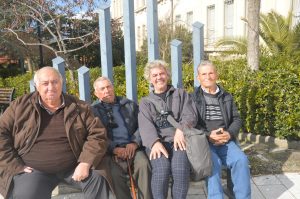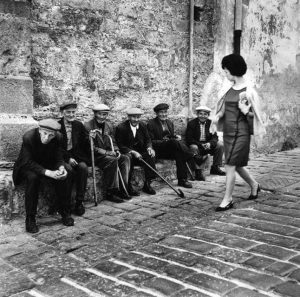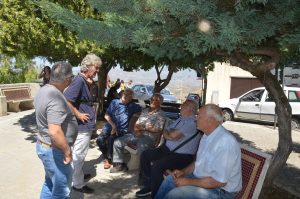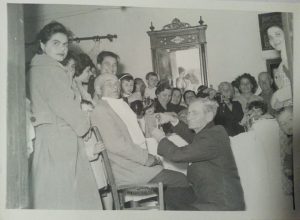The Sicilian Sense of Humor
by Gaetano Cipolla
The emblem for Pirandellian humor is the god Janus who has two faces, one that laughs and one that cries, or as Pirandello said, the face that laughs is laughing at the crying face. And it is the most characteristic form of Sicilian humor embodying the sweet and the sour, the comic and the tragic and seems to emerge from that complex and divided soul that Sicilian share, always flavored with a taste of that italicum acetum (Italian vinegar) that somehow colors everything Sicilian.

It is widely believed that Sicilians, unlike Neapolitans, are not very expansive with their emotions. They are usually represented as brooding, somber characters who are more prone to explode in anger rather than in laughter. D. H. Lawrence who spent quite a bit of time in Taormina and wrote Lady Chatterley’s Lover there. He wrote the following about the character of Sicilians: “These Sicilians are all grave and black inside and without hope.” And Leonardo Sciascia, Vincenzo Consolo and Gesualdo Bufalino, have frequently portrayed them as sullen, resigned, taciturn and desperate individuals who do not know how to sing or laugh.
The American media, too, have contributed in no small part to create the stereotype. Consider the characters of the Corleone family in the Godfather movies. Don Corleone as played by Marlon Brando first and then by Robert De Niro, never cracked a smile or laughed throughout the length of the three movies. Al Pacino’s portrayal of Michael Corleone was even more somber. As the strong, silent type, Michael bore the weight of his family’s woes upon his shoulders. If he had a sense of humor, he gave no evidence of it. No wonder Sicilians have the reputation of being people who always wear long faces, with the corners of their mouths turned downwards, sad islands unto themselves. Sicelitude has come to mean for some discouragement, resignation, fatalism and brooding silence. I want to explore this myth and try to answer the question: do Sicilians have a sense of humor? Do they know how to laugh at themselves and at the world?
Dealing with Sicilians you cannot be too categorical and absolute in one way or the other, because they are complex individuals and the moment you think you found the key, another door presents itself on which the key does not work.

I want to illustrate the quality of Sicilian humor with a story from Vallelunga Pratameno related by the local priest. The patriarch of a Sicilian family died while in a hospital of Caltanissetta. The distraught family was immediately approached by a funeral director who offered his services. He was a fast-talking man, well dressed, with dark glasses who convinced the bereaving family that his firm could be trusted to provide unparalleled services to bury the deceased. He offered to take care of everything, the coffin, a suit for the dead, a funeral car to take the body back to Vallelunga, he even offered to provide a priest, if the town did not have one, quoting a price for each item. The total came to a mere two million and three hundred thousand lire, less, of course, a three hundred thousand lire discount that he would give them, seeing that they seemed such a “nice” family. Before they could reflect, he pushed a contract before the confused and grieving son who, overwhelmed by the avalanche of words, signed it. But as they walked out of the hospital, they realized what they had done, and began to question the deal. “We should have said no,” said the son, “but he didn’t give us a chance to say a word”. The uncle voiced his disappointment, too. But it was the newly made widow who in spite of her inconsolable grief came up with the following remark: “Tantu pi chistu, tantu pi st’autru,” she said, “ci mittemu chistu e ci mittemu st’autru. Macari u parrinu ci vuleva mettiri, e mmenu mali ca lu muortu ci lu misimu nuatri” (So much for this, so much for that,” she said, “we will provide this service and that service, he even wanted to provide the priest! Thank God that we provided the body…). The woman did not have to complete the sentence. But she meant, “God only knows what he would have charged if he had to provide the body too,” a very funny remark worthy of Pirandello. The woman clearly rose above the sorrow and suffering of the moment forgetting her loss in the bitter-sweet smile that must have accompanied her remark. That is an example of Sicilian humor. And it is a perfect illustration of what Cicero, the great Roman orator who spent a year in Marsala as a high official of Rome, said about Sicilians two thousand years ago. For Cicero, Sicilians were “an intelligent race, but suspicious and endowed with a wonderful sense of humor.” He even added that “no matter how terrible a situation may be, Sicilians always have a witty remark to make about it.” The poor widow’s utterance rising above her grief confirms Cicero’s insightful characterization.

Cicero himself provided an illustration of how Sicilians can inject humor in the most difficult situations by relating this little story: a Sicilian was commiserating with a friend in his garden next to a fig tree that his wife had used to hang herself. The man was kicking and excoriating the tree for sharing some responsibility for his wife’s act. The other Sicilian, after listening quietly to his friends’ grief, expressed words of comfort and offered his condolences. Moments later he proceeded to ask his bereaved friend: “Do you think I can have a seedling from this fig tree? I’d like to plant it in my garden!” Clearly, he hoped the fig tree might produce a similar effect on his own wife.

Sicilian humor is generally reflective, ironic, inward turning, self-directed. Let me give you a few samples starting with some proverbs. As Vitaliano Brancati pointed out, Sicilian proverbs are not malicious or sly as Tuscan proverbs are. Consider the following: “Scappari non è virgogna, quacchi vota è sarvamentu di vita!” Running counter to the accepted mode of behavior (in Sicily, to run away from a fight is generally deemed a shameful act. You must stand your ground!), this proverb says that Sicilians are pragmatists with a sense of humor, after all. But the proverb that speaks volumes of the Sicilians’ inward-turning humor is, “ringraziamu a Diu pi chiddu chi nni duna, e a lu re pi chiddu chi nni lassa!” (We thank God for all he gives us and the King for what he leaves us!), in which the Sicilians express their profound resignation to being subjects to forces beyond their control while continuing unperturbed their journeys through life.
Jane Vessels’ article on Sicily published in National Geographic (Aug. 1995) offered another example of Sicilian humor by describing a little dialogue between two drivers stuck in a Palermo’s traffic jam. Traffic is not moving at all and a woman keeps beeping her horn. The man in the car next to her, irritated by her useless beeping, turned to her and barked “But why are you honking?” to which the woman replied, pausing between each syllable, “I…like…the music!” At her brazen response, the man upped the ante, “And I will break your husband’s horns!” Without hesitation, she replied, “And I’ll just make him another pair.” An explanation is in order: in threatening to break her husband’s horns, the man accused the woman of being an adulteress. In Sicily, a man’s head is adorned with horns when his wife cheats on him. Not only is the woman unrepentant about her presumed adultery, she brazenly promises to have another extramarital affair, thus regaling her husband with a new set of horns. To have the last word she is willing to accept the tag as a self-accused adulteress. Hence, the inward-turning quality of her retort. If the anecdote is not true, it is certainly “bien trouvée!”
Gaetano Cipolla, Cultural Department of Splendid Sicily


